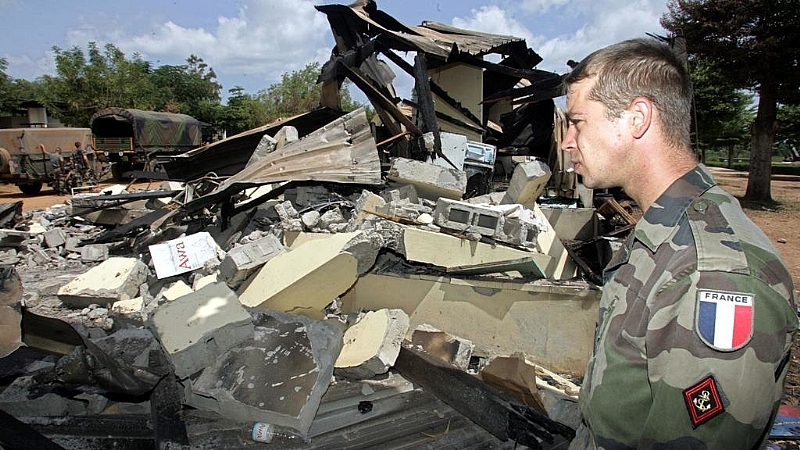
[ad_1]
Criminal proceedings were opened in Paris on Monday following the 2004 attack by two Ivorian fighter jets on a French military base in Bouaké, Côte d’Ivoire, killing nine French soldiers and an American civilian. More than 16 years later, the alleged pilots will be tried in absentia for murder, attempted murder and destruction of property.
“We know who the killers are and they are free,” says Edwige Laliche, who lost his son in the attack, which also injured 38 people and led the French army to put down the Ivorian air force. out of combat.
None of the suspects will appear on the dock in the French court. Former Belarusian mercenary Yury Sushkin, pilot of one of the Sukhoi planes has disappeared, and the two Ivorian co-pilots, Ange Magloire Gnanduillet Attualy and Patrice Ouei benefited from an amnesty law in 2007.
“They destroyed me, destroyed my life,” said Laliche, speaking to Laura Martel of RFI. “There’s a case 16 years later and they’re not there, maybe the hardest thing.”
Unanswered questions
The families of the victims may find it difficult to obtain further closure of the legal proceedings in France given the absence of the accused.
Many questions remain unanswered about the attack of November 6, 2004, in particular which ordered the raid on the French base housing troops forming part of Operation Licorne, deployed during the Ivorian civil war.
Côte d’Ivoire was then split in two with forces loyal to former President Laurent Gbagbo in the south, and rebels supporting Guillaume Soro in the north, with a UN peacekeeping force and troops. French girls stuck in the middle.
Despite a ceasefire signed in 2003 and against the advice of then French President Jacques Chirac, Gbagbo launched an offensive to take back territory from the rebels, notably Bouaké – the seat of the rebellion.
After bombing rebel positions from early morning to noon, Ivorian Sukhoi fighter planes targeted the French base.
Ivorian authorities claimed the attack was unintentional, but the French government insisted it was deliberate.
However, the claim that the attack was in fact a mistake has been disputed by witnesses and details of the circumstances of the raid. So who gave the green light for the bombing?
Several theories
“We have a simple explanation,” explains lawyer Lionel Béthune de Moro, specifying that they were Ivorian planes, so it was therefore an Ivorian decision.
However, the additional information on who gave the order is less clear, according to Béthune de Moro – “was it the head of state, the head of the army – it is not so simple in a country in crisis divided in two ”.
“But of course, what my clients want above all else is the truth. Who authorized this attack? Adds the lawyer.
For those who believe that the Ivorian authorities were responsible for it, the purpose of the airstrike was to get France to reconsider its deployment in this West African country, to withdraw its troops, as well as to divert attention to the difficulties encountered by Gbagbo in retaking the rebel territory.
Connection to Togo
Nevertheless, this theory is somewhat complicated by a murky case in Togo when 10 days after the attack, the Togolese authorities arrested eight Belarusians, which some say could suggest French complicity.
Belarusian nationals were suspected of being linked or in fact responsible for the bombing of Bouaké.
Despite the alert, neither the Minister of the Interior at the time, Dominique de Villepin, nor the former Minister of Defense Michèle Alliot-Marie, nor Michel barnier, the former foreign minister, followed up. The potential suspects have been released.
“The reality for me is extremely simple,” said lawyer Jean Balan, representing the majority of the civil parties, describing how those who held positions of power at the top of the French government were responsible for the attack on Bouaké.
“Look, it was Gbagbo who attacked us, let’s get rid of him,” Balan said, emphasizing the argument that the attack was used as an excuse to oust Gbagbo.
Balan, who has been working on the case for 16 years, says the blame must go to the upper echelons of the French government, given that actors like Alliot-Marie or de Villepin couldn’t stop Belarusians from slipping through their fingers. , and therefore to face the French. Justice.
Ministers must respond
In February 2016, Judge Sabine Khéris estimated that “everything was orchestrated with the aim of making it impossible to arrest, question or try the Belarusian perpetrators of the attack”.
She said the decision to do nothing about the pilots arrested in Togo was taken jointly by the interior ministry, the defense ministry and the foreign ministry.
Khéris referred the case to the court of the Republic, the only court capable of judging government ministers on decisions taken during their tenure.
On May 17, 2019, the court case was closed and it was decided that the three former ministers would not be forced to testify.
It was ruled that the “inaction” of these former ministers was not enough to force them to appear in court, and suspicion that they had interfered in some way was ignored.
All three ministers are nonetheless expected to appear as witnesses in the trial which opens this week.
Their testimonies are eagerly awaited, even for those who do not believe in the theory of some sort of French conspiracy in the Bouaké attack.
“After having arrested the pilots, the mercenaries, then having released them, it is always incredible,” said Jean-Paul Roko, a former soldier who was at the base during the attack, wondering why they did not given the green light to have them transferred. France.
“If there are military secrets, we must give them up, we want answers,” he adds.
[ad_2]
Source link